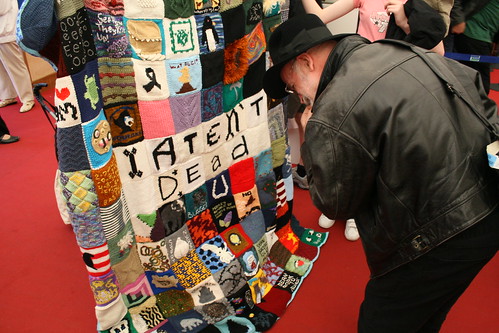|
ODE ON MELANCHOLY
NO, no! go not to Lethe, neither twist
Wolf’s-bane, tight-rooted, for its poisonous wine;
Nor suffer thy pale forehead to be kist
By nightshade, ruby grape of Proserpine;
Make not your rosary of yew-berries,
Nor let the beetle, nor the death-moth be
Your mournful Psyche, nor the downy owl
A partner in your sorrow’s mysteries;
For shade to shade will come too drowsily,
And drown the wakeful anguish of the soul.
But when the melancholy fit shall fall
Sudden from heaven like a weeping cloud,
That fosters the droop-headed flowers all,
And hides the green hill in an April shroud;
Then glut thy sorrow on a morning rose,
Or on the rainbow of the salt sand-wave,
Or on the wealth of globèd peonies;
Or if thy mistress some rich anger shows,
Emprison her soft hand, and let her rave,
And feed deep, deep upon her peerless eyes.
She dwells with Beauty — Beauty that must die;
And Joy, whose hand is ever at his lips
Bidding adieu; and aching Pleasure nigh,
Turning to poison while the bee-mouth sips:
Ay, in the very temple of Delight
Veil’d Melancholy has her sovran shrine,
Though seen of none save him whose strenuous tongue
Can burst Joy’s grape against his palate fine;
His soul shall taste the sadness of her might,
And be among her cloudy trophies hung.
— John Keats (The Oxford Book of English Verse:
1250-1900, 1919 edition)
|

How very classy I feel this week! Keats!
Ah, there is nothing so fine as a bout of wakeful anguish, despite the fact that our culture is well-medicated against anguish, melancholia and depression of all kinds. I came across this ode this week and had to read it over and over again. I am for some reason charmed by the spelling in this poem — words like “kist,” “soveran” and “emprisoned” are lovely examples of the indifferent spelling practices of the 19th century.
Keats is like many of the 19th century’s British poets, in that he equates pleasure with pain and desire with fear or suffering. It seems their happiness could never be unalloyed; in a time when people died from seasonal bouts of influenza and lovers caught in the Spring rain might mean one of them would die of some hideous fever in June, it’s easy to imagine why even joy was something viewed with caution — these poets were literally waiting for the other shoe to drop. Joy is seen blowing kisses, bidding the poor mortals fond goodbyes, as poison comes to take the place of pleasure. Whee.
Startlingly, it seems that Keats is encouraging his readers to embrace melancholy and seek out its veiled hiding places among the raptures of joy. He wants us to look forward to the sadness soon-to-come sadness. In the very temple of delight lurks melancholy. Seems crazy, no? American’s are raised with Puritan ideals, so this sort of …wallowing in grief and soaking up the sadness isn’t something quite tasteful, somehow. We learn pretty early that “suck it up” is the only way to get through. Laugh and the world laughs with you, after all…
An interesting world, where melancholia was prized. Perhaps there used to be a certain nobility in suffering, because it was believed that the sufferer was made melancholy by thought, and thought, of course, is a safely intellectual and highly erudite pursuit. Nowadays, melancholy is shoved rudely aside for bleak depression, which is not the same at all.
*SOME EXPLANATIONS*
If you, as I, were not gifted with a thoroughly classical education, you might not know that Lethe is the River of Oblivion in Greek mythology. Lethe is one of the rivers which flows through the unlovely region of Hades, and the recently dead were required to drink from in, to forget their lives in the living world.
 Wolfsbane is not only a flower which allegedly could help identify werewolves, it’s also a pretty wicked drink made of bitters, cider, blackcurrant and rum, according to the Wiki. (I have to show off my new knowledge of what “bitters” are — some distilled herbal thing British people put in drinks in the pub. Still am not quite sure why anyone wants to drink something bitter, but…live and learn.)
Wolfsbane is not only a flower which allegedly could help identify werewolves, it’s also a pretty wicked drink made of bitters, cider, blackcurrant and rum, according to the Wiki. (I have to show off my new knowledge of what “bitters” are — some distilled herbal thing British people put in drinks in the pub. Still am not quite sure why anyone wants to drink something bitter, but…live and learn.)
You should also know that nightshade has scarlet berries, which are here paralleled to the “ruby grape” of the pomegranate, and every part of the yew tree is deeply poisonous, except the fleshy part of the berry, though its poison was used in medieval medications.
Poetry of a more cheerful countenance can doubtless be discovered at the blog of Read. Imagine. Talk, location of this week’s Poetry Friday.
 Ah, I adore NPR. It’s so lovely to have streaming audio and hear those placid voices I’ve been hearing for years, even though I’m miles from home.
Ah, I adore NPR. It’s so lovely to have streaming audio and hear those placid voices I’ve been hearing for years, even though I’m miles from home.



